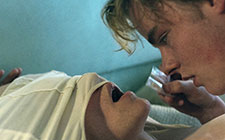|
|
|
|
Grand Jeté
|
 |
|
Bad
Behaviours
During
the 60th year of the Gijón Film Festival (November 2022), I overheard a heated,
dinner-table discussion about how we, as spectators, relate to cinema. Films
often show us bad, evil, immoral or amoral, thoroughly disagreeable people,
involved in what are, by any estimation, very bad behaviours. And not
only as catalysing villains positioned off to the side of the story, but
sometimes – increasingly so today – as central characters in dramas or comedies
of films and television series.
The
question arose: why should we endure this ugly, frequently unedifying spectacle?
Is there anything that can make the experience worthwhile? The escape-hatch
answer that arose from this dinner group came in resounding unison: there has
to be some crack, some glimpse of humanity (however small), that makes this
extreme character relatable to us as viewers. Michael Haneke's take on Elfriede Jelinek’s The Piano Teacher (2001) was offered, typically, as a positive, model
example of this redemptive phenomenon. If the anti-hero lacks relatability in
this way (so the argument goes), the time we spend with the movie is just a
nasty waste.
I
harbour long-held doubts about this generally accepted, humanist wisdom. I have always been intrigued by films that show us
characters who are frankly unrelatable in their extremity, in their
particular badge of Otherness. Isn’t cinema
made (in part, at least) for this kind of shock and provocation, as much as it
is made for the balm of familiarity and mirror-recognition, of (as the depressing
saying goes) seeing ourselves on screen? What a bore! Therapy comes in many forms, and
disconcerting estrangement is surely one of its salutary vehicles.
Grand
Jeté is very much in the Jelinek mode – centring on
a ballet teacher rather than a piano teacher. It explores “transgressive” terrain
(Georges Bataille & co.) that, despite being well-worn, still manages to
shock and uncomfortably confront some spectators. (Some tren(d)spotters would
say it missed the due date by about 20 years, but I appreciate untimely things
that are driven by an individual creator’s commitment or obsession.) The
screenplay is an adaptation by Anna Melikova of a novel by Anke Stelling – a
novel that began some 15 years previously as a first draft for this film,
commissioned by director Isabelle Stever (The Weather Inside, 2015).
It’s easy to miss, in the early scenes, the plot set-up:
the teenage boy, Mario (Emil von Schönfels), whom Nadja (sensational
singer-dancer-performer Sarah Nevada Grether) meets and is subsequently
picked-up by in the street, is, in fact, the son she bore when very young, and (in
a today very familiar plot element) scarcely knows. He's into BDSM sex-club nightlife, and she's after anything that will subdue her array of
physical and/or psychosomatic pains (Stever considers it a body horror film).
What
unfolds is a dramatic essay on perverse “maternal
feelings” (Nadja’s own Mum
[Susanne Bredehöft] pinpoints the issue) that intermingles, for me, the premise
of Bernardo Bertolucci's La Luna (1979) with the masochistic
self-care/harm process of Marina de Van’s In My
Skin (2002). The film piles up its gruesome variations on trauma,
consensual abuse, abjection and abasement.
And
all this filtered through a concerted style – involving blur, motion, light and
colour, relentless deframing of bodies (the cinematographer is Constantin
Campean) – that recalls the experiments of Stephen Dwoskin (Behindert, 1974)
and Philippe Grandrieux (Malgré la nuit, 2015), as well as the glossier
streamlining of that mode by Nicolas Winding Refn.
Grand
Jeté hasn’t yet found many fans (that I am aware of), but I
admired its all-over, determined freakiness. Unrelatable? You bet – or hope.
© Adrian Martin 23 November 2022 |
![]()